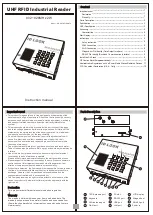
Rev 4.0/7-20
P1/P2 Conversion: #35116
1
INTENDED FOR USE BY SKILLED
PROFESSIONALS • READ AND
UNDERSTAND BEFORE CONVERTING
CONVERSION
INSTRUCTIONS
908 W. Main • P.O. Box 368
Laurel, MT USA 59044
800-548-7341 (phone)
406-628-8231 (phone)
406-628-8354 (fax)
www.WPG.com
CONVERSION BETWEEN SINGLE-CHANNEL
AND DOUBLE
-
CHANNEL VACUUM LIFTERS
For the following model numbers: P11104DC(3), P110(C)04DC(3),
P110T04DC3, P2110445DC(3), P211047DC(3), P210T0445DC3, P210T047DC3
KEEP FOR FUTURE REFERENCE


































